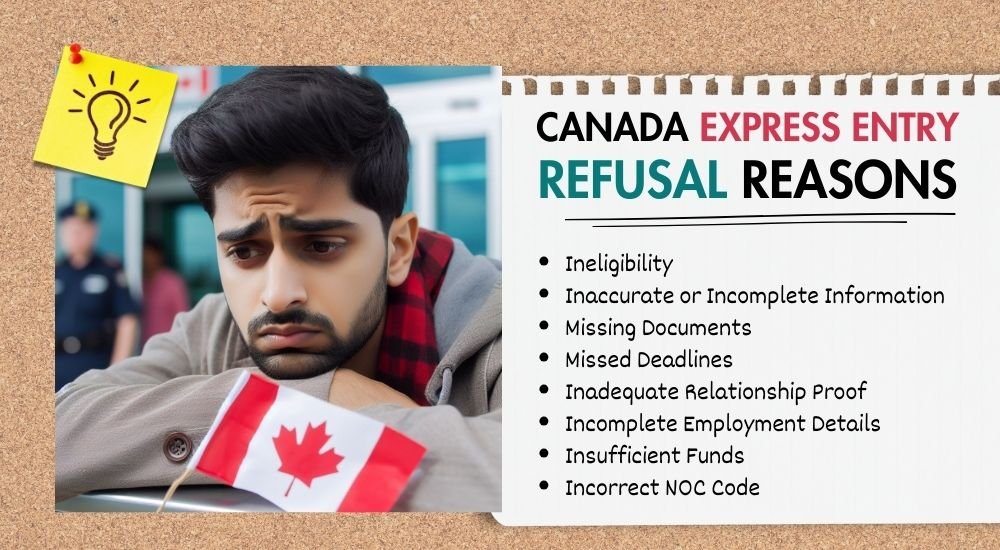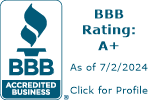“Are you planning to apply for Canadian Express Entry?” Learn from these rejection stories and avoid the common mistakes that could derail your application.
The Canadian Express Entry system is a popular immigration pathway for skilled workers who wish to permanently live and work in Canada. A points-based system evaluates applicants based on age, education, work experience, language proficiency, and adaptability.
The Canadian government has strict requirements and standards for immigration, and failure to meet these requirements can result in an application being denied or delayed. Incomplete or incorrect information can lead to immigration application rejection. Double-check everything before submitting.
Additionally, a denied application can have serious consequences, including loss of application fees, wasted time and effort, and a negative impact on future immigration opportunities.
In this blog, we will explore the top reasons why Canadian Express Entry applications are denied and provide tips on how to avoid these common mistakes.

- Ineligibility Criteria: Applicants must be at least 18, have post-secondary education, skilled work experience of at least one year in NOC 0, 1, 2, or 3 occupations, proficiency in English or French, and adequate settlement funds.
- Failure to Provide Accurate Information: Includes fabricating work or education credentials, not disclosing previous immigration history, and omitting family members, including dependents.
- Missing or Incomplete Documents: Includes police clearance for countries lived in for over six months, educational credential assessments, language test results, proof of work experience, reference letters, and proof of settlement funds.
- Failure to Meet Deadlines: Submitting an Express Entry application within 60 days of receiving an ITA and responding to requests for additional information within specified timeframes.
- Inadequate Proof of Relationship: Providing insufficient proof of relationship with listed family members.
- Incomplete Employment Details: Critical details in employment history, including job title, duties, employer information, etc., are missing.
- Insufficient proof of settlement funds through bank statements, investment statements, property deeds, etc.
- Incorrect National Occupational Classification (NOC) Code
1. Ineligibility Criteria
To be eligible for Express Entry, applicants must meet specific criteria established by the Canadian government. Ineligibility criteria can vary depending on the applicant’s situation but generally fall into several categories. Here is a closer look at the ineligibility criteria for Express Entry:
Age
Applicants must be at least 18 to be eligible for Express Entry. There is no maximum age limit, but applicants over 45 may receive fewer points in the Comprehensive Ranking System (CRS) used to rank Express Entry candidates.
How to Immigrate to Canada after the 40s?
Lack of Education
To be eligible for Express Entry, applicants must have completed a post-secondary education program of at least one year. The program must have been completed at a recognized institution in Canada or abroad.
Insufficient Work Experience
Applicants must have at least one year of skilled work experience in a National Occupational Classification NOC TEER 0, 1, 2, or 3 occupations. The work experience must have been gained in the last ten years and paid and full-time (or the equivalent of part-time hours).
Inadequate Language Proficiency
Applicants must demonstrate proficiency in either English or French by taking a language test approved by the Canadian government. The test measures proficiency in four areas: speaking, listening, reading, and writing. Applicants must meet the minimum language requirements for their occupation.
Lack of Settlement Funds
Applicants must demonstrate that they have sufficient funds to support themselves and their family members during their initial period in Canada. The amount of funds required varies depending on family size and is updated annually by the Canadian government.
Medical Inadmissibility
Applicants may be deemed medically inadmissible if they have a medical condition that could risk public health or safety or result in excessive demand on Canada’s healthcare system.
Criminal Inadmissibility
Applicants may be deemed criminally inadmissible if they have been convicted of a crime or have committed an act considered a crime in Canada.
2. Failure to Provide Accurate or Complete Information
Failure to provide accurate or complete information on an Express Entry application can result in a rejection or even a ban from Canada’s immigration system. Here are some examples of incomplete or false information that can result in ineligibility:
Providing False Information
Applicants who provide false information on their application, such as fabricating work experience or education credentials, may be deemed inadmissible. It’s crucial to provide honest and accurate information throughout the application process.
Not Disclosing Previous Immigration History
Applicants must disclose any previous immigration applications or attempts, including any prior applications to Canada or other countries. Failure to do so can result in ineligibility or even a ban from Canada’s immigration system.
Not Disclosing Family Members
Applicants must disclose all family members, including those not accompanying them to Canada. This includes spouses, common-law partners, dependent children, parents, and siblings. Failure to do so can result in ineligibility or even a ban from Canada’s immigration system.
Not Disclosing Dependent Children
Applicants must disclose all dependent children, including those not accompanying them to Canada. This includes children who are biological or adopted, under the age of 22, and who are not married or in a common-law relationship.

Avoid Unnecessary Visa Refusal with the Help of Licensed Experts
3. Missing or Incomplete Documents
Missing or incomplete documents are a common reason for Express Entry application rejection. Here are some examples of required documents that applicants may overlook or not submit in their entirety:
Police Clearance Certificates
Applicants must provide a police clearance certificate for every country they have lived in for six months or more since 18. This includes countries where they were not citizens or had no passports. Failure to provide police clearance certificates can result in ineligibility.
Educational Credential Assessments
Applicants who completed their education outside of Canada must have their educational credentials assessed by a designated organization to determine their Canadian equivalency. Failure to provide an educational credential assessment can result in ineligibility.
Language Test Results
Applicants must provide language test results to prove their proficiency in either English or French. The test results must be from an approved testing agency and current. Failure to provide language test results can result in ineligibility.
Proof of Work Experience
Applicants must provide proof of their skilled work experience, including reference letters from their previous employers. The reference letters must include details such as the applicant’s job title, job duties, and the duration of their employment. Failure to provide proof of work experience can result in ineligibility.
Proof of Settlement Funds
Applicants must prove they have sufficient settlement funds to support themselves and their family members during their initial period in Canada. The amount of settlement funds required depends on family size and is updated annually by the Canadian government. Failure to provide proof of settlement funds can result in ineligibility.
4. Failure to Meet Deadlines
Meeting deadlines is a crucial aspect of the Express Entry application process. Here are some examples of deadlines that applicants must meet and the consequences for failing to do so:
Missing Application Deadlines
Applicants must submit their Express Entry application within 60 days of receiving an Invitation to Apply (ITA) for permanent residence. Failure to apply within this deadline will expire the ITA, and the applicant must re-enter the Express Entry pool.
Not Responding to Requests for Additional Information or Documentation
After applying, applicants may receive requests for additional information or documentation from the immigration authorities. These requests usually have a deadline, and failing to respond or provide the requested information within the given timeframe can result in a rejection of the application.
5. Inadequate Proof of Relationship
Applicants must provide adequate proof of relationship with family members listed in the application, such as marriage certificates, birth certificates, or adoption papers. Failing to provide sufficient proof of relationship can result in a rejection of the application.
Types of Documents Used as Proof of Relationship
- Marriage certificate
- Birth certificate
- Adoption papers
- Divorce certificate
- Death certificate (in case of a deceased family member)
Common Mistakes to Avoid When Providing Proof of Relationship
- Not providing adequate proof of relationship
- Providing fraudulent documents
- Not providing translated copies
- Not providing original documents
6. Incomplete Employment Details
Incomplete employment details can be a common reason for Express Entry application denials. Here are some critical points to consider when providing employment details in your application:
Information Required for Each Job in the Employment History Section:
- Job title
- Job duties and responsibilities
- Name of employer
- Work location (city and country)
- Employment start and end dates
- Number of hours worked per week
- Salary or wage earned
- Contact information for the employer
7. Inadequate Proof of Funds
Applicants must provide adequate proof of settlement funds to support themselves and their family members during their initial period in Canada. Failure to provide sufficient proof of funds can result in a rejection of the application.
Types of Documents that Can Be Used as Proof of Settlement Funds
- Bank statements are one of the most common documents used as proof of settlement funds. It should show your account balance and transaction history for a specified period.
- Investment statements: Statements from investments such as stocks, bonds, and mutual funds can also be used to demonstrate settlement funds. It should include the current value of the investment.
- Property deeds: If you own property, such as a house or land, you can provide a copy of the deed to demonstrate settlement funds.
- Loan or credit statements: If you have a loan or credit line, you can provide a statement showing the available credit limit as proof of settlement funds.
- Employment verification: A letter from your employer stating your salary and job title can be used as proof of settlement funds.
8. Incorrect National Occupational Classification (NOC) Code
Applicants must select the correct NOC code for their job in their application. Selecting the wrong NOC code or failing to provide a NOC code can result in a rejection of the application.
How to find the correct NOC code for your job
- Visit the official NOC website: The Government of Canada maintains a website that lists all the NOC codes and descriptions. You can visit the website at https://noc.esdc.gc.ca/.
- Search for your job title: On the NOC website, you can use the search bar to find your job’s most relevant NOC code. You can search by your job title, skill level, or keyword.
- Review the NOC code description: Once you find the NOC code for your job, you should read it carefully to ensure that it accurately reflects your job duties and responsibilities.
- Compare it to your work experience: Review your work experience and ensure that it aligns with the NOC code description. You may need to look for a different NOC code if it does not align.
- Consider seeking professional advice: If you are still unsure about the correct NOC code for your job, you may want to seek advice from an immigration consultant or lawyer.
Canada Express Entry Rejection Stories
Here are some examples of Express Entry rejection stories:
Scenario 1: Incomplete Documentation
John, a skilled worker from the United States, submitted an Express Entry application for permanent residency in Canada. Despite having a high score and meeting the eligibility criteria, his application was rejected due to incomplete documentation. John failed to provide sufficient evidence of his work experience and education, so his application was deemed incomplete and rejected.
Scenario 2: Misrepresentation
Maria, a student from Brazil, submitted an Express Entry application for permanent residency in Canada. She provided false information about her language proficiency and work experience, which was later discovered during the immigration process. As a result, her application was rejected for misrepresentation, and she was barred from entering Canada for several years.
Scenario 3: Ineligibility
Ahmed, a skilled worker from Egypt, submitted an Express Entry application for permanent residency in Canada. Despite having a high score and meeting the eligibility criteria, his application was rejected due to ineligibility. Ahmed failed to disclose a criminal history, which made him ineligible for immigration to Canada. As a result, his application was rejected, and he could not pursue permanent residency in Canada.
Scenario 4: Lack of Funds
Rahul, an Indian citizen, submitted an Express Entry application for permanent residency in Canada. However, to his disappointment, he received a rejection letter stating that her application was denied due to a lack of settlement funds. Rahul had not provided sufficient evidence of her financial ability to support herself and her family members during their settlement in Canada. He did not realize that he needed to provide proof of her financial ability for the entire settlement period. As a result, his application was denied, and he was not eligible to apply again for six months.
Scenario 5: Overstaying a Visa
Alex, a skilled worker from France, submitted an Express Entry application for permanent residency in Canada. Despite having a high score and meeting the eligibility criteria, his application was rejected due to previous immigration violations. Alex had overstayed his visa during a previous visit to Canada, which made him ineligible for immigration to Canada. As a result, his application was rejected, and he could not pursue permanent residency in Canada.

Start Your Journey to Canada with ELAAR Immigration
Need help?
In conclusion, the Canadian Express Entry system is a fantastic opportunity for those seeking to migrate to Canada. However, ensuring that your application is complete, accurate, and meets all eligibility requirements is crucial.
As we’ve discussed, there are several reasons why an application may be rejected, including ineligibility criteria, failure to provide accurate or complete information, missing or incomplete documents, and failure to meet deadlines.
To avoid these mistakes and increase your chances of success, it’s essential to seek the advice of a qualified immigration consultant, prepare thoroughly, and pay close attention to the application requirements. With the right approach, you can increase your chances of a successful Express Entry application and start your new life in Canada.
If you have any questions or need assistance with your Express Entry application, please contact us here and reach out to our reputable immigration consultants. Good luck!









